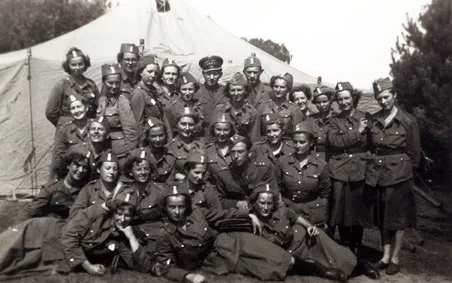This is me during my studies, in the 1940s, after the war. This is a student military camp. I don’t remember who took this picture nor where it was taken.
After the war I wouldn't have married a Jew. I certainly wouldn't have stayed in Poland, if I was to have a Jewish child. That was out of the question. Enough of that! I didn't want it. Just like the hero of Grynberg's book told his mother that he had decided not to be a Jew any more. I had decided the same. In any case I didn't want to have a Jewish child. I said that my life had been through too much in that respect. I've had enough; I don't want to give it to a child as well, so that she would have it, too.
After the war I didn't return to my maiden name at all. Never. I'm still in hiding. That's how you could say it in short. Then I got married, so I took my husband's name. It's a very serious scar. On the whole I didn't say I was Jewish; it depends who I'm talking to. I'm certainly not going to tell the neighbors; where would that get me?
Once I even read the words of an American Jew, who'd been in America for years, who said that in fact he was still in hiding. I could understand that, and I thought to myself, oh yes! That really is a good way of putting it, that you're in hiding. But it depends on character. There are strong characters who don't think like that - absolutely not! Perhaps it's more cowardly people who do - I don't know how to put it. I just didn't want to, and I had no intention of going back to a tradition that I hadn't been attached to before - well, what for? What would be the point?

















